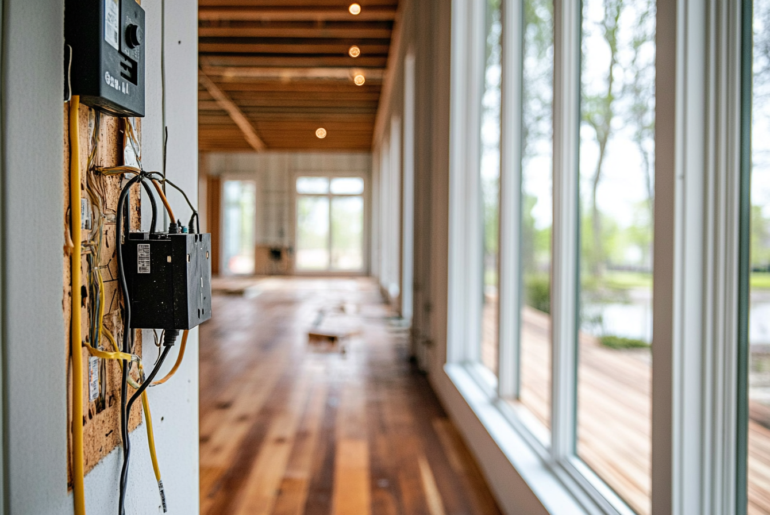This article may contain references to products or services from one or more of our advertisers or partners. We may receive compensation when you click on links to those products or services. Nonetheless, our opinions are our own.
The information presented in this article is accurate to the best of our knowledge at the time of publication. However, information is subject to change, and no guarantees are made about the continued accuracy or completeness of this content after its publication date.
Rewiring your home can be an important step in keeping it safe and working well, especially in older homes with old wiring. It may seem hard, but knowing the basics can make it easier to deal with and help you make smart choices. We will explain why rewiring is necessary, how much it will cost, and the main steps you need to take. If you’re considering rewiring your home for safety, efficiency, or to meet modern electrical needs, we can help you through the process and ensure your home’s electrical system is up-to-date.
Highlights
- Rewiring a house is a big job. It helps improve safety and meets today’s electrical needs.
- The cost can be between $10,000 and $30,000 or even more. This depends on the size of the house and how complex the project is.
- The age of the home, labor costs in your area, and how easy it is to access the wiring can change the total costs.
- You could consider personal loans to help manage these costs.
- It’s important to work with qualified and licensed electricians. They make sure the project is done safely and efficiently.
The Basics of House Rewiring
Rewiring a house means taking out the old wiring and putting in new, modern wiring. It’s like giving the wiring in your house a new look. This work makes sure that the flow of electricity is safe and works well. It helps us meet the needs of all of our devices and appliances.
Over time, electrical wiring can become weaker or not work well in a home. Knob-and-tube wiring and aluminum wiring are examples of old wiring systems that are common in older homes. These homes might need to be rewired.
Importance of Rewiring for Safety and Efficiency
It’s important to be safe when working with electricity. Old wiring can make fires more likely and make electric shock more likely. If you upgrade to new electrical systems that meet current safety standards, your home will be a lot safer.
Safety is the main goal of new electrical systems. They have circuit breakers that turn off when there is too much power. This makes it less likely that electrical fires will happen. You can put Ground Fault Circuit Interrupters (GFCIs) in places like kitchens and bathrooms after you rewire. This can make the risk of getting shocked even lower.
The Typical Lifespan of Residential Electrical Wiring
The life of electrical wiring can change. It depends on the kind of wiring and the situations it goes through. The wiring in most homes lasts between 25 and 40 years.
The lifespan of your electrical wiring can change due to several factors. The insulation on the wiring can be damaged by moisture, very hot or cold weather, and bugs. This damage can make the wiring wear out faster than it should.
Regular inspections by skilled electricians are very important. They can look at the wiring in your house. They will help you figure out if you need to rewire.
Preparing for a Rewire: What You Need to Know
You should know what rewiring means before you start a project. Check for signs that your house needs new wiring first. Next, find out what the laws and safety rules are in your area for electrical work.
This will help you make good decisions. It will also make sure that the project is done safely and that all the rules are followed.
Identifying Signs That Your House Needs Rewiring
There are a few things that could mean your house needs new wiring. If your circuit breaker keeps tripping or your lights are getting dimmer, there may be a problem. Also, if you hear buzzing sounds coming from the outlets, that means the wiring is broken. Old wiring, such as knob-and-tube wiring, can be dangerous and needs to be replaced right away.
If your outlet covers are discolored or feel warm, that could be a warning sign. Also, if you smell smoke or get shocked when you use switches or outlets, that’s a big problem. If you see any of these problems, you should call a licensed electrician to look at your electrical system.
Fixing these problems early can keep things from getting worse, like fires caused by electricity. It will help keep your house safe.
Legal and Safety Requirements for Electrical Work in the US
Building codes in the United States require that electrical work be done safely. You should learn the laws and safety rules before you start rewiring. Read the National Electrical Code (NEC) to learn the rules for working with electricity safely.
Also, remember that local codes may have extra rules that you need to follow. You should get in touch with your local building department. They can help you get the permits you need and set up inspections.
Planning Your Rewiring Project
It may seem like a lot to plan your rewiring project. Breaking it down into small steps can help. To begin, figure out what tools and materials you need to do a good job of rewiring.
Next, learn how to pick the best electrical contractor. This person will be in charge of the project and make sure that safety standards are always met.
Equipment and Resources Required for a Rewire
Having the right tools and materials makes rewiring easier. Here is a list of important items:
- Circuit breakers: They protect your electrical circuits from too much power.
- NM Cables: These cables, which do not contain metal, are commonly used for wiring in houses.
- New Outlets and Switches: Change old outlets and switches to new and safer ones.
- Electrical tape and connectors are key for making strong connections.
These are just a few examples, so keep that in mind. Depending on your project, you may need different things. Talk to your electrician to find out exactly what supplies you should have.
How to Choose the Right Electrical Contractor
For a safe and successful rewiring job, it’s important to choose the right electrical contractor. Always hire a licensed electrician or someone who has worked on rewiring homes before. Before you make a decision, be sure to check their credentials, insurance, and references.
Ask a few different electrical contractors for quotes. This lets you see what services and prices they offer. You should ask them about their experience, the promises they make, and how well they know the building codes in your area.
You will feel better if you hire a good and experienced electrician. You can be sure that your rewiring project is being done safely.
Voted "Best Overall Budgeting App" by Forbes and WSJ
Monarch Money helps you budget, track spending, set goals, and plan your financial future—all in one app.
Get 50% OFF your first year with code MONARCHVIP
Step-by-Step Guide to the Rewiring Process
Now that you know the basics, let’s break the process of rewiring down into smaller parts. The work will be done by a licensed electrician. Still, knowing what to expect at each step can help you get ready. This way, everything will go well.
Always remember that safety should come first at all times.
Step 1: Conducting an Initial Electrical Inspection
The first thing you need to do is hire a qualified electrician to look at the wiring in your home. They will look at the wiring and the electrical panel. This check will help find any issues, safety concerns, or code violations.
The electrician will check the wiring in your home. They will also look at how well the insulation and grounding system are working. They will also look at your electrical panel. They will check for any signs of wear, old breakers, or low capacity.
After the inspection, the electrician will write you a report. This report will tell you what repairs, upgrades, or changes you need to make.
Step 2: Planning the Rewire with Your Electrician
The electrician will help you plan your rewiring project after the first inspection. You need to talk about your needs, budget, and goals at this step. You will have to decide which parts of your house need new wiring. You will also choose the type of wiring to use and where to put new switches, outlets, and fixtures.
You might want to add new circuits for your appliances. You might also want to upgrade your electrical panel to handle more power. Switching to energy-efficient lighting is another good idea.
It’s important to work closely with your electrician right now. This way, your rewiring project will work with your life. It also helps keep your home’s electrical system safe and working well.
Step 3: Undertaking the Rewiring Work
When the plan is ready, your electrician will start the rewiring work. This means that they will run new wires through some areas of your home. They will carefully run the wires through the walls, ceilings, or crawl spaces. This is to make sure that the new wiring meets all safety requirements.
To put in the new wiring, the electrician may have to drill holes in the walls or ceilings. This happens a lot in homes with plaster walls that are older. They will use special tools to pull the wires through these places. They will fix the holes when they are done. This helps protect your walls and ceilings from getting too damaged.
You may need to move some furniture or things around for a short time during this process. It makes it easier for the electrician to do their job without anything getting in the way.
Step 4: Final Inspection and Testing
You should check everything one last time after you finish rewiring. This is important to make sure that everything is in the right place and meets safety standards. It’s likely that your local building department will check to see if it meets electrical codes. The electrician will check all of the switches, outlets, and circuits.
They will check the connections to make sure they are tight. They will also make sure that the new wiring can handle the planned electrical load and that the circuit breakers are working properly. Your electrician will give you a certificate of completion after the inspection is approved. This shows that your wiring project meets the standards that are required.
You should keep this certificate safe. You’ll need it for your insurance and to look back on later.
Budgeting for Your House Rewiring
It costs a lot of money to rewire a house. You need to know what affects the cost so you can make a good budget. The size of your house is very important. More materials and work are needed for bigger homes. The total cost can also change depending on how difficult the job is, how easy it is to get to the wiring, and the electrician’s rates.
Ask a few electricians for quotes. These quotes should include the costs of both materials and labor. When making your budget, remember to include extra costs like inspections and permits.
Breaking Down the Costs: Labor, Materials, and Permits
Let’s break down the typical costs for rewiring a home:
- Labor Costs: Labor is often the largest portion of the total cost, accounting for 50% to 70%. The pay for electricians can vary based on your location, their level of experience, and the local demand for their services.
- Materials: Materials usually account for about 30% to 50% of the total cost of a project. This includes things like wiring, circuit breakers, outlets, and junction boxes.
- Permits and Inspections: Getting the right permits and inspections can raise the overall cost. Usually, this costs a few hundred to a thousand dollars. The price can vary depending on your location.
| Expense Category | Estimated Cost Range |
|---|---|
| Labor | $4,000 – $12,000 |
| Materials | $2,000 – $6,000 |
| Permits and Inspections | $500 – $1,500 |
| Total Cost | $6,500 – $19,500 |
Note: These numbers are only estimates and may vary greatly. You must get personal quotes from experienced electricians to find out the real costs.
Financing Options for Your Rewiring Project
It can be very expensive to rewire your home. You may need help to pay for it. There are a lot of ways to pay for your project, which is good. If you need to pay for something for a short time, a credit card with low interest rates or promotional rates might be a good choice.
You might want to think about personal loans for home improvements if your project is big and you want to pay for it over a longer period of time. A home equity line of credit (HELOC) is another choice. With this, you can borrow money based on how much your home is worth. It usually has a lower interest rate than other ways to borrow money.
When you need a loan, compare the interest rates, terms, and fees of different lenders. This will help you figure out the best way to get money based on your needs and your current financial situation.
Conclusion
For safety and efficiency, it’s very important to keep your electrical system up to date. You should know what to look for to see if your house needs new wiring. Also, make sure you follow the law. Pick a reliable electrical contractor when you plan your rewiring project.
Don’t forget to plan for costs like permits, materials, and labor. Look into financing options if you need help paying for the project. To keep your family safe, you should think about hiring a pro to do the rewiring. Please don’t hesitate to get in touch with us if you have any questions or need help with your rewiring project.
Frequently Asked Questions
How much does it typically cost to rewire a house in the US?
In the US, it usually costs between $10,000 and $30,000 to rewire a house. Larger homes, which have more square feet and more complicated electrical wiring needs, often cost more at the higher end of this range.
Can I stay in my house during the rewiring process?
While rewiring, it is not always safe to be in your home. This could lead to power outages and make it more likely that your property will be damaged. You and your things should find a place to stay for a short time.
How long does a typical house rewiring take?
It can take anywhere from a few days to a few weeks to rewire a house. The size of your house and how hard the work is will determine how long it takes. You can lessen the effect on your daily life if you plan ahead and work with your electrician.
Are there any government grants available for rewiring?
It can be hard to find government grants to help with rewiring homes. But there might be some programs that can help. These programs might be able to help homeowners with low incomes who need to fix or upgrade their electrical systems.
How often should a house be rewired?
There are a few important things that will tell you if you need to rewire your house. These are the age of the house and how well the electrical system works. Every 20 to 30 years, it’s a good idea to have a professional check it out. This will help you check to see if your wiring meets the latest safety standards.

Reviewed and edited by Albert Fang.
See a typo or want to suggest an edit/revision to the content? Use the contact us form to provide feedback.
At FangWallet, we value editorial integrity and open collaboration in curating quality content for readers to enjoy. Much appreciated for the assist.
Did you like our article and find it insightful? We encourage sharing the article link with family and friends to benefit as well - better yet, sharing on social media. Thank you for the support! 🍉
Article Title: Cost to Rewire a House: Budgeting for a Safe Upgrade
https://fangwallet.com/2025/08/02/cost-to-rewire-a-house-budgeting-for-a-safe-upgrade/The FangWallet Promise
FangWallet is an editorially independent resource - founded on breaking down challenging financial concepts for anyone to understand since 2014. While we adhere to editorial integrity, note that this post may contain references to products from our partners.
The FangWallet promise is always to have your best interest in mind and be transparent and honest about the financial picture.
Become an Insider

Subscribe to get a free daily budget planner printable to help get your money on track!
Make passive money the right way. No spam.
Editorial Disclaimer: The editorial content on this page is not provided by any of the companies mentioned. The opinions expressed here are the author's alone.
The content of this website is for informational purposes only and does not represent investment advice, or an offer or solicitation to buy or sell any security, investment, or product. Investors are encouraged to do their own due diligence, and, if necessary, consult professional advising before making any investment decisions. Investing involves a high degree of risk, and financial losses may occur including the potential loss of principal.
Source Citation References:
+ Inspo
There are no additional citations or references to note for this article at this time.











































